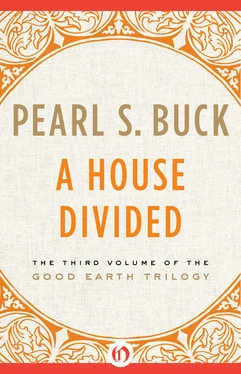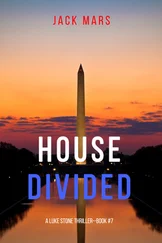“I did not!” she cried, and then beside herself this maid stamped her foot and she leaned forward and gave Yuan’s face a swift sharp slap, as though he were indeed a naughty child. “You know how busy I have been — who was that woman he told of? — and this was your last evening — and I had planned — Oh, I hate you!”
And she burst into weeping and ran quickly away, and Yuan stood in an agony, not comprehending anything except she said she hated him. So ended his poor holiday.
The next day Yuan returned to his work, and alone, for Meng had shorter holiday and was already gone. The rains of late winter were begun, and the train drove through the dark day, and the water dripped down the window pane, so that he could scarcely see the sodden fields. At every town the streets ran with, liquid filth and the stations were empty except for the shivering few men who must be there for some duty, and Yuan, remembering how he had not seen Mei-ling again, for he left in the early morning and she was not there to bid him good-bye, said to himself this was the dreariest hour of his life …
At last weary of watching the rain and in restless dreariness he took from his bag the book of verses Sheng had given him the first night, and which he had not read yet, and he began to turn the thick ivory paper, not caring much if he read or not. On each page were printed clear and black a few lines or words, a little group of strung phrases, seeming exquisite, Yuan thought, until he grew curious and half forgot his trouble, and read the book again more carefully, and then he saw these little poems Sheng had made were only empty shapes. They were only small lovely empty shapes, all exquisite and empty although they were so fluent in their line and sound that almost Yuan forgot their emptiness until, the shape seized, he found there was nothing there within them.
He closed the pretty silver-bound book, and put it in its cover again and laid it down. … Outside the villages slipped past, dark and huddled in the rain. At doorways men looked sullenly into the rains that beat through the thatched roofs above their heads. In sunshine these folk could live outdoors as beasts do, and thrive merrily somehow, but days of rains drove them into their hovels and too many days of rain drove them half-mad with quarrelling and cold misery, and now they looked out with hate against heaven who sent such long rains down.
… The verses were of lovely delicacies, the light of the moon upon a dead woman’s golden hair, an ice-bound fountain in a park, a faery island in a smooth green sea, narrow between pale sands …
Yuan saw the sullen beast-like faces, and he thought, very troubled, “As for me, I can write nothing. If I wrote these things Sheng does, which I can see well enough are exquisite, why, then I remember these dark faces and these hovels and all this deep under-life of which he knows nothing and will not know. And yet I cannot write of such life either. I wonder why I am so speechless and troubled?”
And so he fell to brooding and to thinking perhaps that no man can create anything who lives not wholly anywhere. He remembered how on that feast day he had thought himself between the old and the new. And then he smiled sadly, thinking how foolish he had been to think himself not alone. He was alone.
… So it rained on to his journey’s end, and he came down from the train in rain and dusk, and in the rain the old city wall stood grim and black and high. He called a ricksha and climbed in, and sat chill and lonely while the man dragged the vehicle along the slippery running streets. Once the man stumbled and fell, and while he righted himself and waited for a moment to pant and wipe the rain from his dripping face, Yuan looked out and saw the hovels still clinging against the wall. The rains had flooded them and the wretched helpless folk within sat in the flood and waited silently for heaven to change.
Thus began for Yuan the new year, which he had thought would be his best and happiest year. Instead it began in every sort of evil. For the rains held that spring beyond all bearing, and though priests in temples made many prayers, nothing came of all their prayers and sacrifices except new evil, for such superstitions stirred up ardent angers in the young rulers who believed in no gods at all except their own heroes, and they commanded the temples in those parts to be closed, and ruthlessly they sent soldiers to live in those temples and drive the priests into the smallest worst rooms. Then this in turn made angry the farmer folk, who could be wroth enough against those selfsame priests for one cause or another when they came begging, but who feared now that the gods might be angry anew, and they cried that doubtless all these evil rains were because of these new rulers, and so for once they joined the priests against the young rulers.
For a month the rains held, and still they held, and the great river began to swell and rise and flow into the lesser rivers and canals and everywhere men began to see the coming of the same ancient floods, and if flood, then famine. Now the people had believed that the new times would bring them somehow a new heaven and a new earth, and when they found this was not true, and heaven behaved as carelessly as ever it did, and the earth gave forth no more for harvest in flood or drought than ever it did, they cried out the new rulers were false and no better than the old ones, and old discontents, stilled for a while by new promises of new times, began to rise again.
And Yuan found himself divided again, too, for Meng was pent in his narrow quarters all these many days and not able to spend the vigor of his young body in his usual training of his men, and he came often to Yuan’s room and quarreled with everything Yuan said and he cursed the rains and he cursed his general and he cursed the new leaders whom every day he said grew more selfish and careless of the people’s good. He was so unjust sometimes that Yuan could not forbear saying one day, very mildly, “Yet we can hardly blame them that it rains so much, and even if there is a flood, we cannot blame them for that.”
But Meng shouted savagely, “I will blame them, nevertheless, for they are no true revolutionists!” And then he let his voice drop and he said restlessly, “Yuan, I’ll tell you something no one else knows. But I tell you because though you are so spineless and join in no cause clearly, still you are good enough in your way and faithful and always the same. Hear me — when one day I am gone, you are not to be surprised! Tell my parents not to be afraid. The truth is within this revolution there grows now another — a better, truer one, Yuan — a new revolution! And I and four of my fellows are determined to go and join it — we shall take our loyal men, and go into the west where the thing is shaping. Already thousands of young good eager men have joined secretly. I’ll have my chance yet to fight against this old general who keeps me down so low!” And Meng stood glowering for a moment until suddenly his dark face grew bright, or bright as it ever did, for it was a sullen face at best, and then he said thoughtfully and more quietly, “That true revolution, Yuan, is for the people’s good. We shall seize the country and hold it for the common people’s good, and there shall be no more rich and no more poor—”
And so Meng talked on and Yuan let him talk in half-sad silence. He had, he thought heavily, heard these words all his life somewhere, and still there were these poor, and still there were these words. He remembered how he had seen the poor even in that rich foreign country. Yes, there were always the poor. He let Meng talk, and when at last he was gone, Yuan went and stood by the window for a while and watched the few people trudging through the rain. He saw Meng come out and stride along the street, his head high even in the rain. But he was the only proud one. For the most part the only figures were the rain-soaked ricksha pullers, struggling over the slippery stones. … He remembered again what he never could wholly forget, that Mei-ling had not written to him once. Nor had he written to her, for, or so he said simply to himself, “There is no use in writing if she hates me so.” And this set the seal of sadness to the day.
Читать дальше












